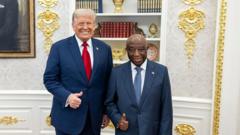Since taking office, President Trump's erratic tariff policies have disrupted global trade negotiations, causing confusion among trading partners and stalling economic progress as companies struggle to adapt to the shifting landscape.
Tariff Turmoil: The Impact of Trump's Inconsistent Trade Policies

Tariff Turmoil: The Impact of Trump's Inconsistent Trade Policies
President Trump’s unpredictable tariff strategies create global trade uncertainty, leaving partners in disarray and hindering economic growth.
Article Text:
In the wake of President Trump’s recent tariff announcements, the world of international trade has been swept into disarray. Just six months into his presidency, negotiations that once appeared structured and promising have devolved into chaos, leaving global partners in a state of confusion.
Trump's trade approach has seen him alter deadlines abruptly, terminate negotiations without warning, and raise unexpected concerns linked to non-trade issues. For instance, his fixation on Brazil's political landscape or the influx of fentanyl from Canada has complicated what should be straightforward tariff discussions.
According to Airlangga Hartarto, Indonesia's economic affairs minister, negotiations with the U.S. resemble “navigating a labyrinth” only to find oneself back at the starting point. Such instability has stifled the necessary planning that companies and nations rely upon to adapt to new trade rules.
Carsten Brzeski, the global macroeconomics chief at ING bank, described the resulting uncertainty as “poison” to the global economy. What was once the prospect of sealing 90 deals in 90 days has been replaced by minimal agreements with major trade players like China, while others receive abrupt notifications of impending tariffs set to begin on August 1.
The bipolar nature of the U.S. trade policies under Trump poses significant risks for international relations and economic stability, as trading partners grapple with the unpredictability of future interactions. The repercussions of this erratic approach may ripple throughout the global trading system, affecting diverse markets and industries.
In the wake of President Trump’s recent tariff announcements, the world of international trade has been swept into disarray. Just six months into his presidency, negotiations that once appeared structured and promising have devolved into chaos, leaving global partners in a state of confusion.
Trump's trade approach has seen him alter deadlines abruptly, terminate negotiations without warning, and raise unexpected concerns linked to non-trade issues. For instance, his fixation on Brazil's political landscape or the influx of fentanyl from Canada has complicated what should be straightforward tariff discussions.
According to Airlangga Hartarto, Indonesia's economic affairs minister, negotiations with the U.S. resemble “navigating a labyrinth” only to find oneself back at the starting point. Such instability has stifled the necessary planning that companies and nations rely upon to adapt to new trade rules.
Carsten Brzeski, the global macroeconomics chief at ING bank, described the resulting uncertainty as “poison” to the global economy. What was once the prospect of sealing 90 deals in 90 days has been replaced by minimal agreements with major trade players like China, while others receive abrupt notifications of impending tariffs set to begin on August 1.
The bipolar nature of the U.S. trade policies under Trump poses significant risks for international relations and economic stability, as trading partners grapple with the unpredictability of future interactions. The repercussions of this erratic approach may ripple throughout the global trading system, affecting diverse markets and industries.





















